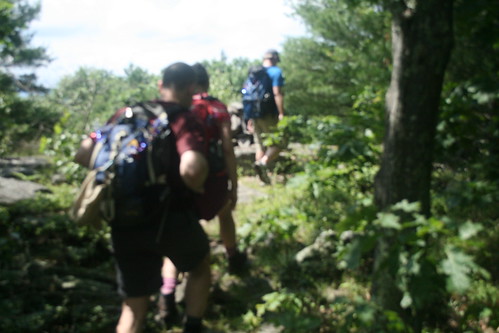Read yesterday's post about ten winter hiking tips. These are ten general hiking tips.

Tell someone where you are going
Alright we all completely know this right? Tell someone where you are going and when you expect to be back. I actually abide by this. All the time. I mountain bike alone frequently, so I've run into mechanicals that I can't fix and have gotten really, really lost enough times to require a pick up.
One time I told my boyfriend that I was going mountain biking and that I would be back or give him a call saying I was all done by 2 p.m. After my bike ride I decided to do some last minute Christmas shopping and then visit a friend. I came home at around 8 p.m. to a very worried Mr. Mountain Man .
"Where the heck have you been?" he asked.
"Oh crap, I forgot to call. Oh my gosh did you call the police?" I asked.
Turns out he didn't. I was pretty mad. I could have been out there with a broken leg waiting for Mountain Man to call in the troops. Mr. MM said he should have called, but so should have I. Moral of the story. If you tell someone where you are going and when you'll be back, tell them what to do when you don't get back on time. And for yourself. Remember to check back in!
Be Calculated
This one is a little harder for me to describe. Here goes... If you are going to try out a new trail or mountain that you haven't been on before be very calculated. Read lots of maps and check out online if there are any funky trails/parking lot/river things going on that might impede your day. Don't try a new mountain after a fresh snowfall. Don't come down an unfamiliar trail in the dark. Try new trails and such, but be sure to only have one different variable at a time (eg. fresh snow, unfamiliar trail, night hike, new hiking partner, kids on hike, etc.)

Have Multiple Ways to Start Fire
If you bring waterproof matches, also bring a zippo, and some treated cotton balls and a flint and a... you get the point. Have a bunch of different ways to start a fire. If you are hiking in a group everyone should be carrying several ways to start a fire.
Bring Extra Clothes
Extra layers for summiting or unexpected stops. Bring a hat, gloves, rain gear, and extra socks even on the warmest summer day.
Bring Extra Water and Ways to Get Water
Bring more than enough water and at least one or two other ways to treat water. In case you have to spend the night unexpectedly you should have a stove which you can use to boil water. A water filter, iodine, or other water treatment methods are also nice backups.
Bring a Map/Compass and Know the Terrain
This is so important and the most frequently broken rule. Take this scenario. If you are heading to a mountain that you have hiked before you might think- I don't need a map. What happens if you make a wrong turn down a trail and realize it two hours too late? If you have map there may be another route back you can take.
Maps help for emergency ways back down to roads too. One icy cold winter day my friend Sonya and I planned a ten plus mile hike over several small peaks. We were heading up the second mountain when her hip started to bother her. By the time we summited she was barely hobbling along and we needed a bail out plan. We whipped out the map and tried to head down a tiny side trail to a road where we could arrange a pick up. Without the map we would have truly been in a pickle.
Bring Light
Bring a headlamp or if you are old-school a flashlight. I've been on way too many accidental night hikes. They're very useful to have in the backpack. Extra batteries doesn't hurt either.
Bring a First Aid Kit
A few basic supplies and a little ingenuity can manage most outdoor issues.
Bring a few Mountain Girl Supplies
Here are a few things in my hiking backpack and my camelbak for long trips. A multi-tool/ pocket knife---endlessly useful. Duct tape either wrapped around a pen (for emergency writing-jk) or a water bottle. Duct tape is also endlessly useful.
Emergency Shelter
I don't always bring my lightweight tent, but if I need to spend the night I always have ideas and options. I keep a small tarp in my backpack that I've had to whip out on a few backpacking trips. I also know I can use a combination of my extra clothing and gear and a few pine boughs to get the job done. Taking a quick survival class that covers emergency shelters should make you feel a little better about this one.

2 comments:
More great tips! :-D
Thanks a bunch ;)
Post a Comment